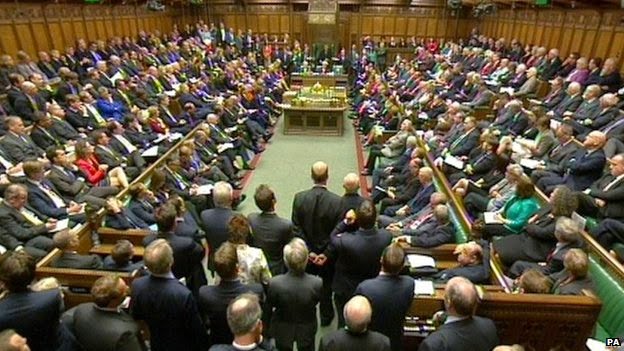 Let’s
look forward to what the New Year holds in store, the
coming months will be increasingly dominated by the General Election on Thursday 7th May
2015.
Let’s
look forward to what the New Year holds in store, the
coming months will be increasingly dominated by the General Election on Thursday 7th May
2015.
Before
we groan at the thought of endless political clamour we should recognise the
significance of government and politics.
If
there are specific policies we deprecate it is worth asking what we did to
persuade politicians and public opinion not to choose them as opting
out removes our right to complain.
The
generations who struggled to win votes for all must turn in their graves at the
40% who don’t bother to vote and anyone cynical about politicians has to say
what they have done to help elect people they respect.
The
2010 election gave no party a majority and the Coalition was born and the polls
currently suggest a similar result but not another coalition.
If
he doesn’t win a majority Mr Cameron is thought to favour a minority
government and Labour leaders are having similar thoughts.
The
Liberal Democrats have suffered from being in coalition and are expected to
lose seats and they will want to restore their political identity and not join
another coalition.
Alternative
coalition partners are unattractive and Cameron is said to have ruled out
working with UK Independence Party (UKIP), who are unlikely to win enough seats
to make much difference anyway.
A
Labour led coalition with the Scottish National Party (SNP) is unlikely if the
nationalists take many traditionally Labour seats in Scotland but they will
probably be the third largest party at Westminster..
Minority
government is fragile and only survives if given ‘supply and confidence’
support by the smaller parties.
This
means voting with the government so that it wins votes of ‘no confidence’ and
passes its Budget.
With
that in mind the Conservatives have been cosying up to the eight Democratic Unionist MPs and Labour might do a similar deal with the SNP if the concessions
demanded by the Scots are not excessive.
We
voters will have a big say in what happens but we might not like the result.
Minority
governments are vulnerable to pressure from their own extremes as John Major
experienced in the 1990’s.
Perceptions
of weakness would only increase voter cynicism and they would also make it more
difficult for Ministers to tackle difficult issues such as climate change and
developing low cost sources of energy, that require long term planning.
Sorting
out the economy and the right balance between the responsibilities of the State
and the individual and the implications of that for taxation and the welfare
system won’t happen in a weak government.
Determining
Britain’s future international role and relationship with the European Union (EU) also call for a government not constantly fighting for survival.
Christians
concerned about the incidence of family breakdown and the moral state of the
nation will also be frustrated by governments lacking the will and authority to
adopt appropriate policies.
Secular
materialism and moral relativism will continue to shape public opinion and
public policy until a credible Christian voice persuades us to change course.
My
New Year resolution will be to pray for this.


















